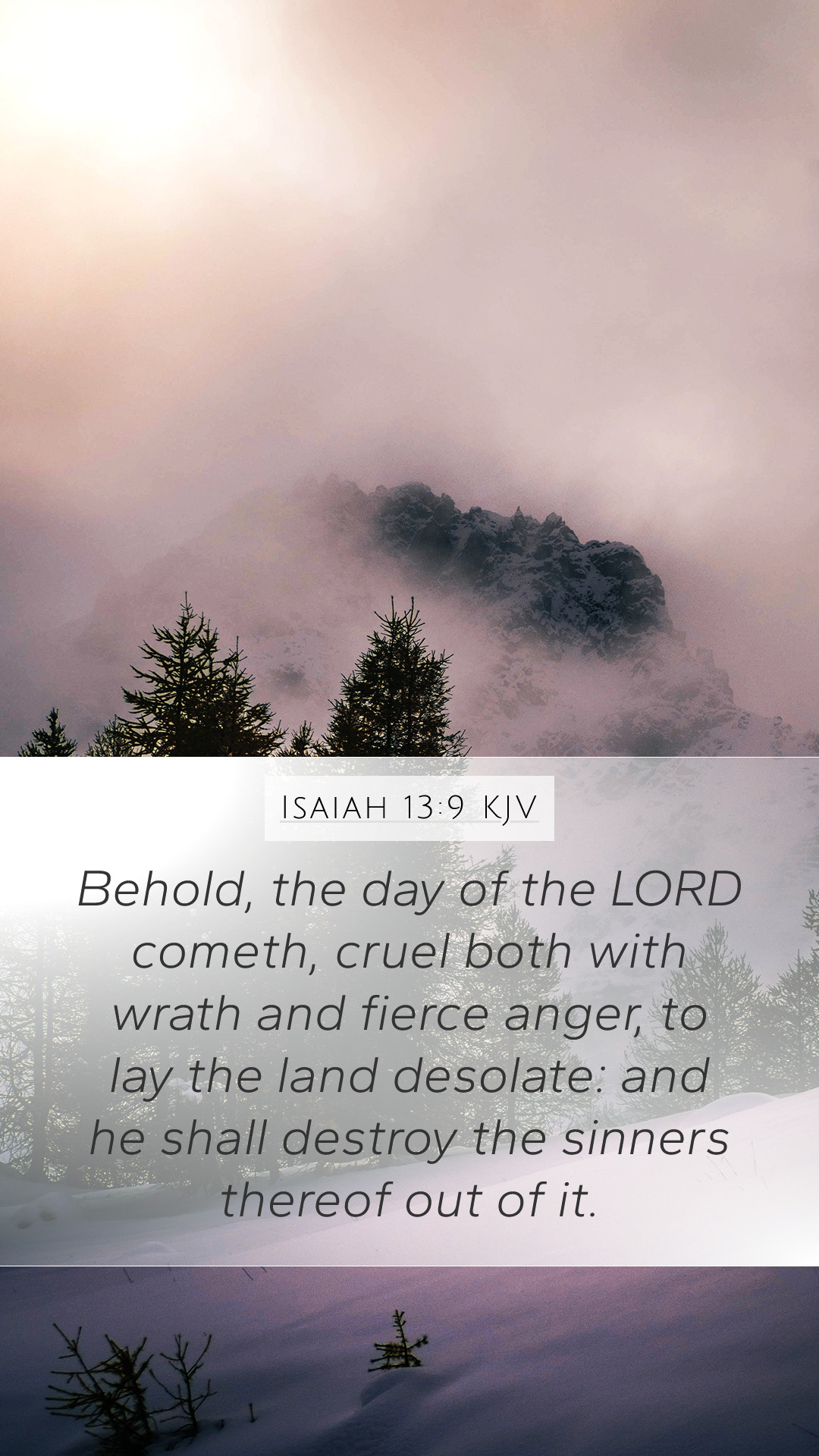Understanding Isaiah 13:9: A Comprehensive Commentary
Isaiah 13:9 states: "Behold, the day of the Lord comes, cruel, both with wrath and fierce anger, to lay the land desolate: and he shall destroy the sinners thereof out of it." This verse is a powerful proclamation regarding God's impending judgment, reflecting themes that emerge throughout scripture.
Bible Verse Meanings
The meaning of this Bible verse centers on divine justice and the consequences of sin. It serves as both a warning and a reassurance to those who might fear the consequences of their actions. The day of the Lord is often described in scripture as a time when God intervenes directly in human affairs.
Key Themes in Isaiah 13:9
- Divine Wrath: The passage illustrates God's righteous anger against sin. As noted by Matthew Henry, this "cruel" day reflects a necessary response to the evil that has persisted on earth.
- Judgment: The text emphasizes that the purpose of this day is to "lay the land desolate," a theme echoed throughout prophetic scripture. According to Albert Barnes, this desolation symbolizes spiritual and physical destruction for those who do not heed divine warning.
- Protection of the Righteous: While the verse focuses on judgment, Adam Clarke highlights that it also serves as a protective measure for those who walk in righteousness. God’s judgment clears the way for the faithful to thrive.
- Prophetic Context: Recognizing the historical context of Isaiah provides a deeper insight into this verse. It speaks to the nation of Babylon's imminent fall and serves as a broader message applicable to all nations that reject God.
Bible Verse Interpretations
Various scholars emphasize bible verse interpretations that reveal the depth of this prophecy.
- The term "day of the Lord" is understood as a specific era where God executes justice.
- This verse can be applied to modern contexts, reflecting on how individuals and nations fare under God’s moral law.
- The importance of repentance and the active decision to pursue a relationship with God emerges in this interpretation, ensuring that one is sheltered from such divine wrath.
In-Depth Commentary
The commentary on Isaiah 13:9 elucidates that God's judgement is not arbitrary but is rooted in His holiness and the natural consequences of sin. Matthew Henry notes that while God is invariably forgiving, His justice requires punishment for the forsaking of His righteousness.
As believers engage in Bible study insights, they can utilize this verse as a foundational passage for understanding God's character and the gravity of sin. The intensity of God's wrath urges believers to appreciate His grace and mercy more profoundly.
Apply Bible Verse Understanding
- Consider the significance of personal accountability in light of God's judgment.
- Reflect on your own life and determine areas that require repentance and alignment with God's will.
- Utilize resources from Bible study groups to further explore themes of judgment and mercy in scripture.
Cross References
This verse can be connected to several other scripture passages which enhance its meaning:
- Joel 2:1-2: A call to repentance with warnings of the coming day of the Lord.
- Amos 5:18-20: Warns against longing for the day of the Lord, which is a day of darkness for the unfaithful.
- Revelation 6:16-17: Describes the great day of God’s wrath and the consequence of being outside His grace.
Conclusion
Isaiah 13:9 serves as a profound reminder of the seriousness of sin and the reality of divine judgment. Through careful scripture analysis, believers can gain a deeper understanding of God's character and His expectations of humanity. By engaging with this verse, individuals are called towards discernment, repentance, and ultimately, toward embracing the grace found in a relationship with God.


